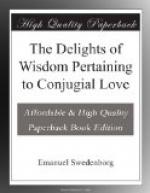ON JEALOUSY, n. 357-379.
Zeal considered in itself is like the ardent fire of love, n. 358. The burning or flame of that love, which is zeal, is a spiritual burning or flame, arising from an infestation and assault of the love, n. 356-361. The quality of a man’s zeal is according to the quality of his love; thus it differs according as the love is good or evil, n. 362. The zeal of a good love and the zeal of an evil love, are alike in externals, but altogether different in internals, n. 363, 364. The zeal of a good love in its internals contains a hidden store of love and friendship: but the zeal of an evil love in its internals contains a hidden store of hatred and revenge, n. 365, 366. The zeal of conjugial love is called jealousy, n. 367. Jealousy is like an ardent fire against those who infest love exercised towards a married partner, and like a terrible fear for the loss of that love, n. 368. There is spiritual jealousy with monogamists, and natural with polygamists, n. 369, 370. Jealousy with those married partners who tenderly love each other, is a just grief grounded in sound reason, lest conjugial love should be divided, and should thereby perish, n. 371, 372. Jealousy, with married partners who do not love each other, is grounded in several causes; arising in some instances from various mental weaknesses, n. 373-375. In some instances there is not any jealousy; and this also from various causes, n. 376. There is a jealousy also in regard to concubines, but not such as in regard to wives, n. 377. Jealousy likewise exists among beasts and birds, n. 378. The jealousy of men and husbands is different from that of women and wives, n. 379.




